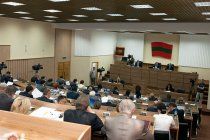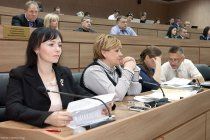 Русский
Русский English
English-







To Create Conditions for the CEC
There is nothing surprising that elected representatives are busy adjusting the electoral law - 29 November this year scheduled for the election of deputies of the Supreme Council and deputies of representative bodies of local authorities. A single day of voting for the first time in the history of the republic will be another test of its viability. The people have the right to delegate the management of state elected deputies and the head of state only by means of electoral processes in full compliance with generally accepted democratic norms.
The author of a number of legislative initiatives in the sphere of electoral law was the deputy of the Supreme Council Grigory Dyachenko. One of them concerns the simplification of the procedure of formation of election commissions of different levels, and the other, which was considered at today's plenary session - proper quorum for the meeting of the Central Election Commission, the decisions taken in their course, were legitimate. The essence of the proposed by parliamentarian amendments is that the number of participants in the meeting of the CEC, in which it is considered competent, was not 2/3 of its elected membership but the majority.
In contrast to the Russian Federation, members of our Central Electoral Commission (except the chairman and secretary) work in this agency not on a permanent basis, which to some extent create problems with the conduct of its meetings. They can be carried out only on condition that there are 2/3 of the members of the CEC. This has already led to the fact that on 1 May this year the term has expired, when the local authorities have the right to form a territorial election commission. Now, only CEC can make it, several meetings of which for March and April were disrupted because of the absence of the committee members to meetings and, as a consequence, the lack of quorum.
That's why the legislative initiative of the deputy Grigory Dyachenko offered at the legislative level to enshrine the duty of members of the Central Election Commission to participate in its work.
In this case these legislative initiatives are lack of only one vote, in order to become part of the legal framework.




